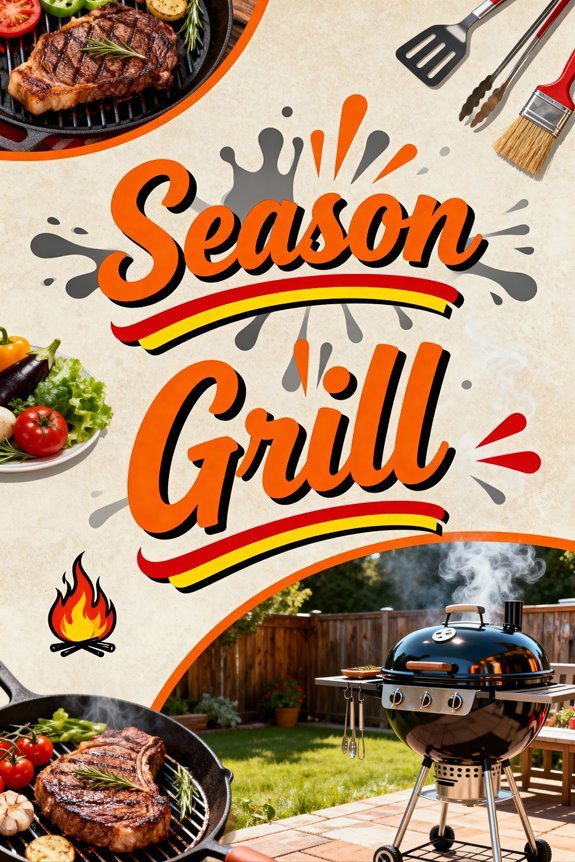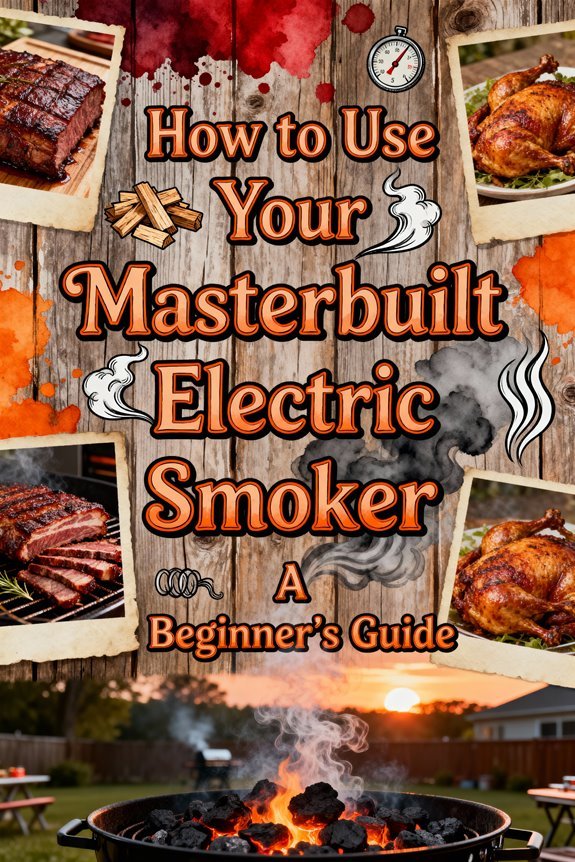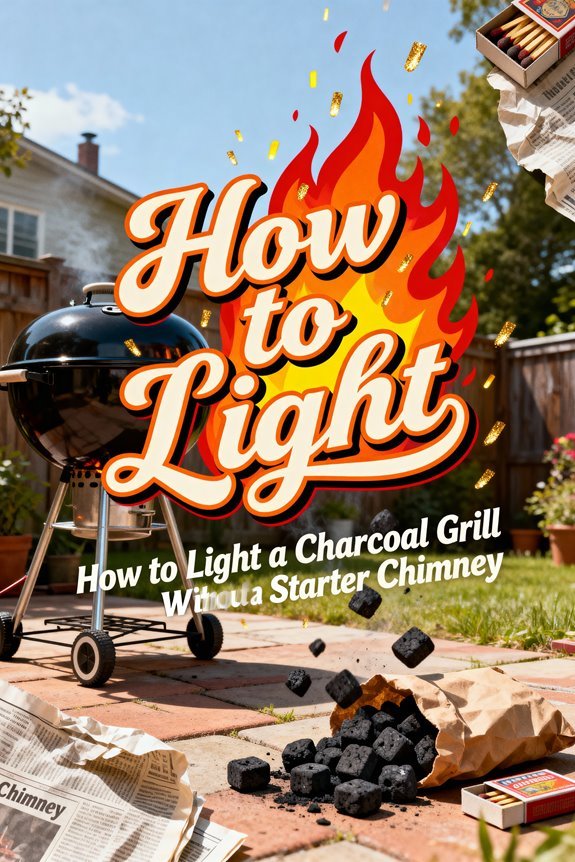To restore cast iron grill grates, first soak them in white vinegar for several hours to remove rust and debris. Scrub thoroughly with a wire brush, then rinse and dry completely. Heat your grill to 400-450°F and apply multiple thin layers of high smoke point oil, letting each layer bake for 40-60 minutes. Maintain your restored grates by cleaning after each use and applying a protective oil coating. Follow these professional techniques to achieve legendary cast iron performance.
Understanding Cast Iron Grill Grate Maintenance
Cast iron grill grates stand as the workhorses of outdoor cooking, offering unmatched durability and heat retention for the perfect sear. To guarantee grate longevity, you’ll need to understand their fundamental composition and care requirements. These grates consist of a sturdy iron alloy, often enhanced with seasoning or porcelain coating for non-stick properties and rust resistance. Similar to stainless steel grills, warm soapy water provides an effective initial cleaning solution for cast iron maintenance. Maintaining lower cooking temperatures can help minimize harmful carcinogens that form during high-heat grilling.
Your cleaning frequency directly impacts the grate’s performance and lifespan. Before each use, heat your grill to 500-550°F to burn off residue, then brush thoroughly. After grilling, remove food debris and apply a protective layer of high smoke point oil. For optimal maintenance, many grillers use half an onion to clean their grates effectively. This regular maintenance routine preserves the seasoning while preventing rust formation. If your grates include a porcelain coating, you’ll still need to maintain them, though they offer additional protection against corrosion.
Essential Tools and Materials for Cleaning
Success in grill grate maintenance begins with assembling the right cleaning arsenal. You’ll need a selection of cleaning brushes, including brass or stainless steel bristles for tough debris, and nylon or Palmyra brushes for gentler cleaning tasks. For ideal safety, don’t forget protective gear like gloves and safety glasses. For optimal cleaning results, consider using a firefighter-grade sponge brush that eliminates the risks associated with wire bristles breaking off. Regular cleaning is especially important when grilling at medium-high heat to prevent grease and food residue from becoming baked on.
When it comes to chemical cleaners, you’ve got several effective options. Simple Green BBQ & Grate Cleaner and Zep Grill Degreaser work well for removing stubborn grease, while natural alternatives like baking soda paste offer a non-toxic approach. A thorough cleaning kit like the Cast Iron Grill Kit provides all essential tools in one package. You’ll also want to keep essential tools like grill scrapers, Scotch-Brite scrubbers, and polishing cloths on hand. Remember to store your cleaning supplies in a well-ventilated area and always follow proper safety protocols when using chemical cleaners.
The Vinegar Soak Method
Among the most reliable cleaning methods for cast iron grates, the vinegar soak stands out for its effectiveness and simplicity. To begin, place your grates in a large container or heavy-duty garbage bag, then pour enough white distilled vinegar to completely submerge them. You’ll find vinegar’s effectiveness varies with soak duration – light cleaning needs only 10-30 minutes, while stubborn rust and grime require several hours or overnight soaking. A quick wipe-down after each grill use can significantly reduce the need for deep vinegar soaks. Regular deep cleaning sessions twice per grilling season help maintain optimal grate performance.
Once soaking is complete, scrub the loosened debris with aluminum foil or a brush, then rinse thoroughly with warm water. For enhanced results, you can apply a baking soda paste before the vinegar soak. After cleaning, dry the grates completely and immediately apply a thin layer of cooking oil. Heat the oiled grates for 10-15 minutes to create a protective, non-stick surface. For pellet grill owners, maintaining a consistent 350 degree temperature during the final heating step helps ensure optimal seasoning of your restored cast iron grates.
Tackling Stubborn Rust and Residue
When dealing with stubborn rust and residue on cast iron grill grates, you’ll need a systematic approach that combines mechanical and chemical cleaning methods. Start your rust removal by preheating the grates to 200°F to loosen debris, then use wire brushes and scrub pads for initial cleaning. A 48-hour vinegar soak can dramatically reduce the effort needed to remove stubborn rust deposits. Avoid using harsh chemicals that could contaminate your cooking surface.
For tougher rust spots, employ fixed blade tools or grinder wheels, but always wear protective gloves during these cleaning techniques. After removing the rust, create a paste with baking soda and water to tackle remaining grime. Consider upgrading to stainless steel grates for better rust resistance in the future. Use brass brushes for detailed cleaning in hard-to-reach areas, and finish with a thorough hot water rinse. Don’t forget to dry the grates completely and apply a protective oil coating to prevent future rust formation.
Deep Cleaning Techniques for Severe Cases
For the most challenging cast iron grill grate conditions, deep cleaning demands a systematic combination of heat treatment and manual cleaning techniques. Begin by heating your grates to 600°F for two hours, which acts like a self-cleaning cycle to loosen stubborn debris. Regular maintenance with proper cleaning tools will prevent severe buildup from occurring in the first place. Using a grill degreaser helps break down tough residue and protects your grill’s longevity. Consider using Bar Keepers Friend for especially tough grime and residue buildup.
When facing severe buildup, you’ll need to employ advanced scraping techniques using plastic or wooden tools, followed by targeted cleaning with nylon brushes. For emergency rust solutions, you can carefully use steel wool, but only as a last resort to avoid damaging the surface. Apply a mixture of hot water and mild dish soap for brief soaking periods under an hour, then scrub thoroughly with non-metallic pads. Once clean, immediately dry the grates and apply a protective seasoning layer using high-temperature cooking oil.
Proper Drying and Storage Practices
Proper drying and storage practices serve as the cornerstone of cast iron grill grate maintenance. After washing, immediately use a clean towel to dry your grates thoroughly, then heat them at 400°F to eliminate any remaining moisture. Apply a thin, uniform layer of cooking oil using a paper towel to create a protective barrier against rust. Using an Easy Function scraper helps remove any lingering debris before storage to prevent deterioration. Following a deep clean schedule each season helps prevent harmful grease buildup and extends grate longevity. Like modern removable plates, thoroughly cleaning after each use prevents food buildup and simplifies maintenance.
Your drying techniques should always conclude with proper storage solutions. Store your grates in a dry environment with good airflow, avoiding sealed containers or plastic bags that trap moisture. Don’t store them inside the grill while damp, as this promotes rust formation. For humid climates or extended storage, consider using dehumidifiers or silica gel packs. Remember to inspect your grates regularly and maintain light seasoning between uses to preserve their condition.
Re-Seasoning Your Grates for Longevity
Re-seasoning cast iron grill grates transforms them into durable, non-stick cooking surfaces while providing essential protection against rust and deterioration. To achieve ideal re seasoning benefits, start by thoroughly removing rust and debris with a wire brush, then clean with baking soda paste. Once your grates are completely dry, preheat your grill to 400-450°F. Using a grill scraper tool before cleaning helps remove stubborn carbonized residue more effectively. For optimal results, soaking your grates in warm soapy water helps loosen tough buildup.
These virtually indestructible grates will serve you well for generations with proper maintenance. Apply a thin, even layer of high smoke point oil like canola or vegetable oil using lint-free cloths. Among effective seasoning techniques, you’ll want to heat the oiled grates for 40-60 minutes at medium temperature, allowing the oil to polymerize properly. Let the grates cool completely, then repeat this process 2-3 times to build a robust seasoning layer. This creates a protective barrier that enhances cooking performance and makes cleanup easier.
Regular Care and Maintenance Schedule
Building on your freshly seasoned grates, a consistent maintenance schedule will keep them in excellent condition throughout their lifespan. Regular cleaning after each use is essential – brush your grates while they’re still warm (500-550°F) to remove food particles effectively. Instead of wire brushes, using crumpled aluminum foil provides a safer and equally effective cleaning method. You’ll need to perform deep cleaning every 5-10 uses, soaking and scrubbing with mild soap and water to tackle stubborn residue. For safety during cleaning, always ensure the propane tank is disconnected before starting any maintenance work.
Conduct monthly inspections to check for rust or damage, and don’t forget to replace your grill brush annually. The maintenance frequency depends on how often you grill, but you shouldn’t skip the basics: immediate post-cooking cleanup, proper storage with the grill covered, and keeping the dampers slightly open to prevent moisture buildup. Address any signs of rust promptly to maintain your grates’ integrity. Using high-smoke point oils during regular seasoning helps create a durable protective layer on your grates.
Tips for Preventing Future Rust Formation
To effectively shield your cast iron grill grates from rust, maintaining a robust protective barrier is essential. Apply multiple layers of vegetable oil or bacon grease after each use, ensuring complete coverage through four to five passes. This seasoning process creates your primary defense against moisture. Strong and durable cast iron requires consistent care to maintain its quality.
Your cooking practices play an important role in preventive measures. Preheat your grill for 15-20 minutes before use, and cook at higher temperatures to minimize food sticking. After cooking, brush the warm grates clean and apply a fresh oil coating. Using a natural cleaning paste made from baking soda and vinegar can help remove stubborn residue without damaging the grates. For optimal food safety, always ensure grates reach proper temperatures when reheating previously grilled foods. Don’t forget to leave the dampers slightly open when closing your grill to prevent condensation. For extended storage, coat grates heavily with oil, wrap them in plastic, and keep them covered. Remember to use gentle cleaning methods that won’t strip the seasoning layer you’ve carefully built.







